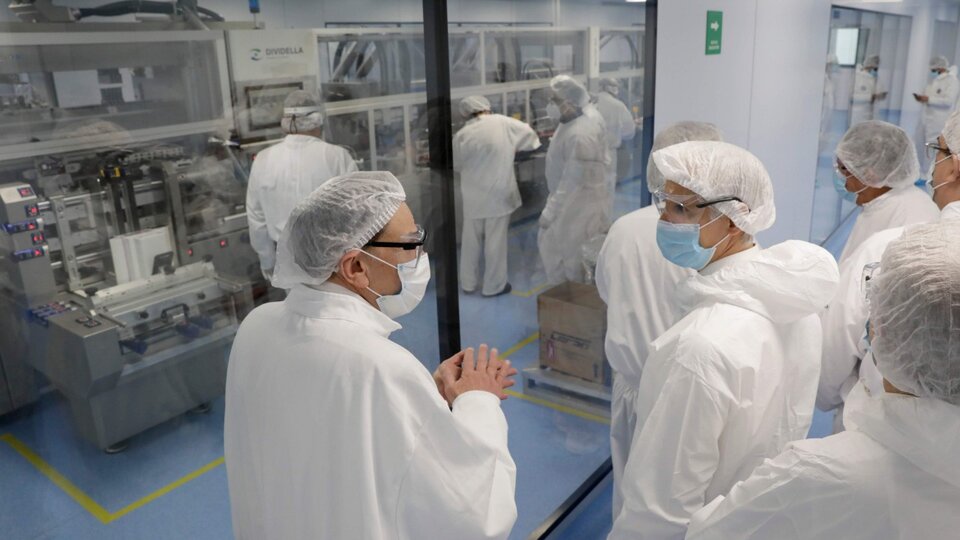
[ad_1]
This Tuesday, around 9 a.m. Argentina time, 7 a.m. in Mexico, Alberto Fernandez will join what is called “Las mañaneras de AMLO”, press conferences organized each morning by the President of Mexico, Andrés Manuel López Obrador. In this virtual meeting, Fernández and López Obrador They will give a kind of kick-off to the distribution of the Oxford-AstraZeneca vaccines manufactured with the active ingredient produced in Argentina and with the completion made in Mexico. Part of this project had to be referred to a factory in Albuquerque, United States, from where 843,000 doses arrive on Monday. But Fernández and AMLO will announce that shipments are also leaving Mexico: perhaps 800,000 vaccines will arrive this week.
The Oxford-AstraZeneca project in Argentina and Mexico was one of the strategic measures of the Alberto Fernández government.
- On the one hand, he launched the production in the country of the basics of the vaccine, the active ingredient, the element that fights the virus.
- It is not a minor problem that the Oxford-AstraZeneca vaccine is the cheapest, basically because the developer – the University of Oxford – doesn’t make a profit for at least the first year. The value is four dollars, compared to 20 dollars for most other vaccines. In the alliance with pharmaceutical giant AstraZeneca, Oxford also demanded that it be manufactured in different parts of the world.
- This meant a very important transfer of technology and testified to the confidence in the scientific and production level of Argentina.
- According to molecular biologist Ernesto Resnik, those who received the first vaccines a year ago are keeping their antibodies well, but everything indicates that the new variants will sooner or later require to be vaccinated again, as is the case. with the flu. With this project, Argentina consolidates its long-term production.
The project lasted two months longer than expected. Production in Argentina, in charge of the mAbxience laboratory, of Hugo Sigman’s Insud Group, produced the active ingredient without problem and on schedule. Like any export of pharmaceutical equipment, it required ANMAT approval, so it has already been verified from within the country. In total, mAbxience delivered 50 million doses of the active substance, which were shipped in 15-liter containers, frozen.
In Mexico, the delays started, but due to a North American blockade problem. The government of the time President Donald Trump did not authorize the export of material for the production of vaccines and this prevented the arrival of the filters necessary to finish the doses at the Liomont laboratory in the state of Mexico. Pascal Soriot, CEO of AstraZeneca Global, also hinted that there were problems in the quality control carried out by the British laboratory in Liomont.
After a tortuous process, the situation is finally as follows:
- Of the 50 million doses already shipped by mAbxience, 21 million have been diverted to another AstraZeneca plant, Albuquerque. Of the 843,000 doses arrive this Monday on a Latam Cargo flight and the promise is that 3,100,000 more will arrive before the end of the month. Maybe it will last a few days until the beginning of June, as there have been delays for an authorization from ANMAT. AstraZeneca sources said Page 12 that, from the United States, In addition, three million more doses will arrive in Argentina in June. It should be taken into account that the production is distributed in other Latin American countries.
- The rest of the doses are being finished in Mexico and everything is ready for shipments to begin. This is what Fernández and AMLO will announce this Tuesday. So far, it has not been revealed how many vaccines will be shipped initially, but the rumor has it that there will be an 800,000 match this week.
- In May, mAbxience remodeled the Garín factory. This will allow it to produce active components of 30 million doses in June.. Of course, they will have to be completed in Mexico and the United States, but that bodes well for the supply of significant quantities of vaccines in the months to come.
Of course, the opposition continues to beat the patch, arguing that there are no vaccines and that this is due to an ideological bias in contracts and agreements. The reality is that the government signed the main production deal with AstraZeneca, a UK laboratory based in Cambridge. The bet on the Sputnik vaccine was also a success, it is now approved in 65 countries and in the coming weeks it will have the approval of both the European Community and the World Health Organization, despite the geopolitical war unleashed in the field of vaccines.
At Casa Rosada, they hope that by mid-June all Argentines with risk factors will be vaccinated, with at least one dose. In other words, all people over the age of 60 and people aged 18 to 59 with pre-existing conditions.
.
[ad_2]
Source link
 Naaju Breaking News, Live Updates, Latest Headlines, Viral News, Top Stories, Trending Topics, Videos
Naaju Breaking News, Live Updates, Latest Headlines, Viral News, Top Stories, Trending Topics, Videos